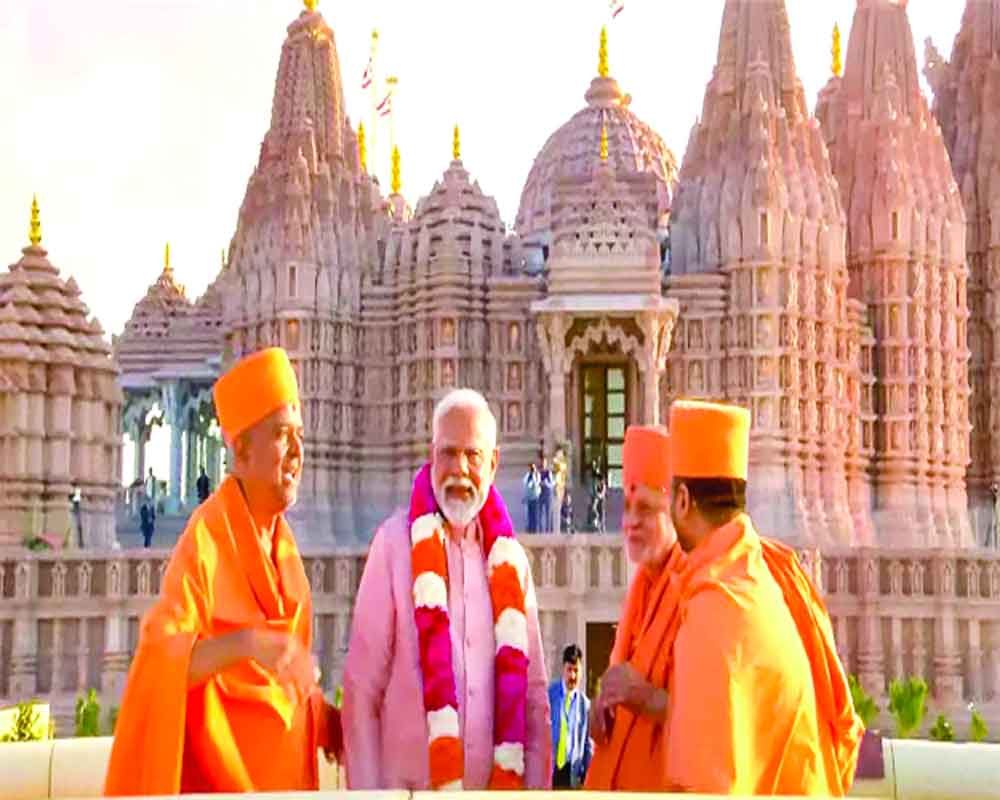In a display of interfaith unity, Islam embraced Hinduism as a grand Hindu temple was inaugurated in Abu Dhabi, symbolising a momentous shift in religious dynamics
On the Vasant Panchami of the year 2024, on the desert plane of Abu Dhabi, history performed what can arguably be called its first dance in the realm of faith, religion and God. Never before has Islam shaken hands with the idol-worshipping Hindus. The religion of Prophet Mohammad has accepted the Jews and Christians as Ahl-e-Qitab, meaning, People of the Book, whether of the Torah or Bible. Muslims have also obeyed and strictly adhered to the third of Prophet Moses’ Commandments: “Thee shall not make any gravel image of thy Lord the God”.
That is why idols or statues of any kind were abandoned by all three religions originating from the credo of Prophet Abraham, whose inspiration Prophet Moses followed. No act by their followers to even attempt to have a glimpse of God can ever be countenanced by these faiths. The synagogue, church and mosque have been limited to being only prayer halls, unlike the Hindu temple, which is looked upon as a residence of the divine where the worshipper or follower is free to seek or meet the divine. Ramakrishna Paramahansa, Swami Vivekananda and Maharshi Aurobindo, for example, confessed to having seen the divine. Until now, this has been a fundamental difference between the Hindu and Abrahamic faiths; the latter have preferred to destroy idols rather than allow them to distract the devotion of their adherents. This fundamental gulf of faith explains the catalogue of iconoclasms that litters Indian medieval history.
That is why it appears incredible to believe that any human being can achieve two victories in the course of only two years—the first at Ayodhya and the other now at Abu Dhabi. Ayodhya represents the correction of the history of iconoclasm while the event at Abu Dhabi reveals the nobility of King Zayed, the monarch of the United Arab Emirates (UAE), in wiping off some of the tears of blood dripping from Hindu eyes, who, over the course of a millennium, lost thousands of their temples to iconoclasm.
King Zayed has shown the courage that perhaps no monarch in history has. There have been many kings who have made history, have invented systems and legislated path-breaking laws. It is, however, difficult to think of a monarch who has reversed history and turned his back on the past with such ease. For a thousand years now, Islam has chosen the path of taqlid (orthodoxy)—minimal change—and has done its best to avoid ijtihad (reinterpretation)—embracing new ways when necessary. The objective was to conserve the strength and unity of Islam and not allow it to dissipate.
When it came to numbers, therefore, Islam has been an expanding torrent. What King Zayed has done is to pick up a hitherto untouchable aspect, reinterpretation, and in doing so, has touched the hearts of 140 crore Indians, as Prime Minister Modi has said. How many Muslim hearts might have been irritated by this remains to be seen. But the notes emanating from this seminal event are likely to be less than pleasant to a lot of ears, around the Islamic world. Pockets are easier to open; hearts are far more difficult to persuade, which is what King Zayed has done. He can, however, be sure that most Hindus will pray for his happiness as long as history is written.
The opening of the grand Hindu temple in Abu Dhabi also has the potential to trigger schisms in the Abrahamic faith world, particularly Islam. However, this need not be necessarily an unwelcome development. Not only will millions of Hindus flock there, but their inflow will also bring in billions of dollars as revenue from tourism and the business that flows from it.
The Muslim world, which has been negligent towards commerce, as Prof. Timur Koran of Duke University has explained, will have a chance to rectify this lacuna. This marvel of sculpture, which is also a live and functioning museum of the most exquisite carvings consecrated by the confluence of the holy waters of the Ganga, Yamuna and Saraswati (represented by white light) specially brought from India is precisely the edifice, platform and opportunity for that.
Prime Minister Modi’s inauguration and worship of this sprawling and breathtaking Hindu temple at Abu Dhabi is in a sense, not only the rise of Sanatana Dharma in the desert but also a reversal of centuries of crusades and Ghaznavism. The temple, which of course has the icons of deities, is also rich with carvings, sculpted images and bass reliefs, including those of animals and birds; one could also liken it to a veritable museum-cum-zoo of stone.
Most important though, is our Prime Minister’s centrality in the act of worship through his performance of the main aarti in the temple’s sanctum sanctorum. Modi is a practising and worshipping Hindu, something that comes through clearly, whether at Kathmandu, Varanasi, Ayodhya, Rameshwaram or Abu Dhabi. Bhakti is visible and convincing only when it emanates from the heart; otherwise, it is nothing but the enactment of a ritual without devotion. In Modi’s case, it is a phenomenon that needs no evidence or convincing, a fact I have been fortunate to witness first-hand in my own humble dwelling when a much younger Modi had graced an occasion where holy figures were present.
(The writer is a well-known columnist, an author and a former member of the Rajya Sabha. The views expressed are personal)


























